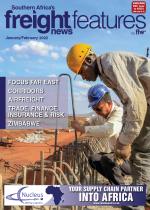Covid-19 has taken its toll across southern Africa’s corridors, highlighting the importance of harmonisation and cooperation.According to Leslie Mlungisi Mpofu, executive director of the Trans-Kalahari Corridor Management Committee (TKCMC), few countries could have foreseen the impact of Covid-19, the quarantine policies, and the national lockdowns experienced, not only in the region but around the world.“Our biggest goal on the Trans-Kalahari Corridor Secretariat (TKCS) has been to ensure the seamless f low of goods and people. Major inroads have been made in this regard over the past few years. We have seen our efforts bear fruit and some real gains have been achieved,” he told Freight News. “All our endeavours have, for some time, been aimed at ensuring there is harmonisation of regulations and procedures, but this has really been put to the test in the Covid environment.”Mpofu said the lack of harmonisation on Covid protocols had slowed down the movement of goods and people significantly over the past two years.“Every government has the right to protect its people. It is an important function, and from a corridor perspective one must appreciate that, but at the same time we do need to harmonise these approaches and find a balance in what we are doing to ensure that we are not bringing trade to a halt.”Using the example of Covid PCR tests, Mpofu explained how unharmonised protocols could have severe impacts. “In South Africa, the PCR test has a validity of 30 days, in Namibia, it is seven days, and in Botswana only 72 hours. This has a real knock-on effect on the ground for truck drivers who are not able to do multiple entries into countries with one test, or who are unable to turn their truck around fast enough to still have the same test valid when exiting a certain jurisdiction. These kinds of things have been very difficult.”He said it was therefore essential to increase cooperation and communication between countries as part of ongoing efforts to improve trade facilitation and seamless movement of goods and people.“It is critical for our economic growth as a region that we have well-functioning corridors where cargo moves seamlessly and freely from one country to the next. It is not in anyone’s benefit if there are delays and unnecessary stops that are driving up the costs of transport.”Mpofu said the TKCMC continued to work closely with the various governments as part of its efforts to ensure cargo f low.“We don’t see the TKC only as a transport corridor, but rather as an economic developmental corridor – an integrated network of infrastructure within the region designed to stimulate economic development. We need to create more employment opportunities for people along the corridors, and that must have an impact across the value chain.”He said reducing delays at border posts was another important goal for the TKCMC. “This also adds to the high transport and operational costs. Delays at border posts also result in a much-reduced shelf life of products when they finally arrive at destinations. These costs are all passed on to the general public. It is the consumer that is affected most.”He said investment in the TKC was ongoing as this contributed to its status as an economic development corridor. “There are many opportunities along the TKC which I believe is a shining example of how a corridor can and should function. It requires, however, that we not take our eye off the ball and continue to invest and develop the corridor.”

